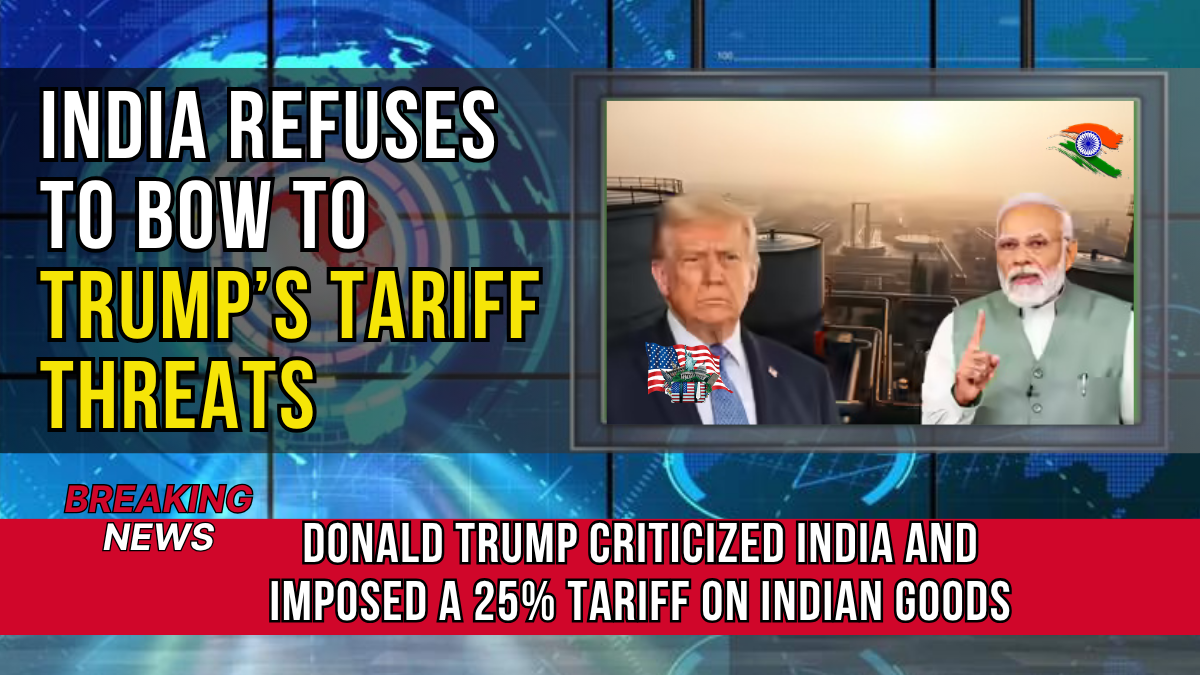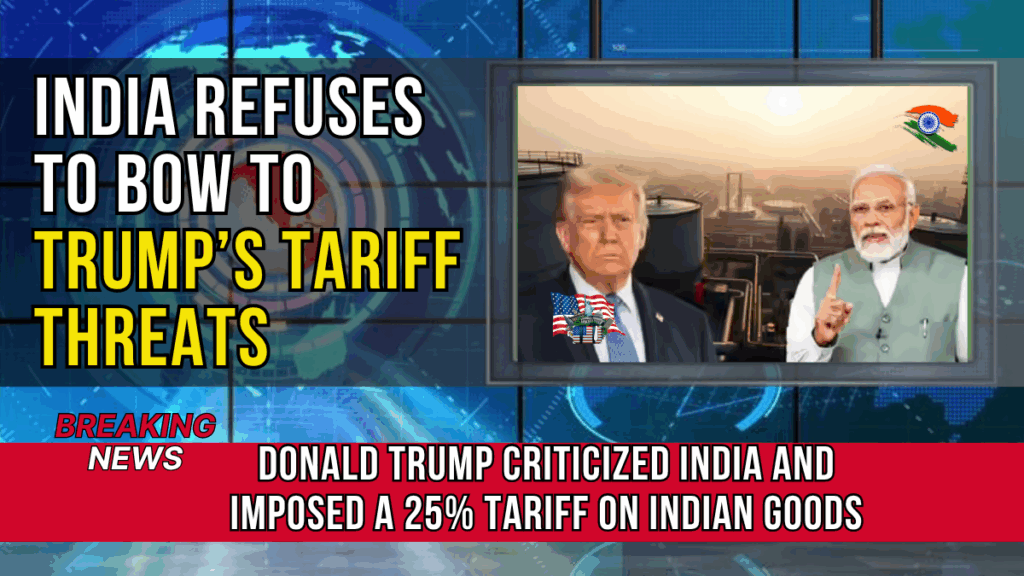India has reportedly not issued any directive to its oil refiners to stop the import of Russian crude oil, despite mounting pressure from the United States and recent tariff threats by former US President Donald Trump. According to a Bloomberg report, Indian authorities have prioritized the country’s energy security and economic interest over diplomatic tensions, and refiners remain free to source crude based on commercial feasibility.

This decision highlights India’s delicate balancing act in maintaining strong ties with both Russia and the United States, two major global powers with conflicting geopolitical interests, particularly in light of the ongoing Ukraine conflict.
Summary Table: India Refuses to Bow to Trump’s Tariff Threats
Key Details |
Information |
|---|---|
Topic |
India’s position on Russian oil amid Trump’s tariff threats |
US Pressure |
Donald Trump criticized India and imposed a 25% tariff on Indian goods |
India’s Official Directive |
No formal order issued to stop Russian oil imports |
Refiners’ Freedom |
Refiners continue to buy oil based on commercial needs |
India’s Energy Policy |
Based on market pricing, availability, and national interest |
Alternate Planning |
Refiners asked to prepare contingency sourcing plans |
India’s Russian Oil Share |
Russia accounts for nearly one-third of India’s crude imports |
Key Alternative Sources |
US, Abu Dhabi, Gulf countries |
Official Website |
Backdrop: Trump’s Tariff Threats and Criticism
Donald Trump recently imposed an unexpected 25 percent tariff on Indian exports, citing India’s strong energy and defense relations with Moscow as a concern. In a public statement, Trump criticized India’s reliance on Russian oil and claimed he had “heard” that India would be ceasing these purchases, calling it “a good step.”
These comments stirred international speculation about whether New Delhi would bow to US pressure and shift its energy sourcing away from Russia. However, the latest reports from Bloomberg and The New York Times suggest otherwise.
India’s Current Stand: No Official Ban on Russian Oil
According to Bloomberg, Indian officials have confirmed that no decision has been made to direct refiners—public or private—to halt the import of Russian crude. People familiar with the matter, who declined to be named due to the issue’s sensitivity, clarified that refiners remain free to choose their suppliers based on pricing and availability.
This decision underlines India’s commitment to energy sovereignty and strategic autonomy. The country is keen to maintain economic and energy stability rather than respond reactively to political pressure.
Refiners Continue Business as Usual
Both state-run and privately owned refiners are continuing to buy Russian oil, driven by commercial interests. In fact, the New York Times, quoting senior Indian officials, reported that India would continue buying Russian oil even if the US imposes penalties.
India’s Ministry of Petroleum has not issued any public directive indicating a shift away from Russian energy imports. Instead, officials have discreetly advised refiners to prepare contingency plans in case sourcing from Russia becomes unviable due to global restrictions or sanctions.
Contingency Planning Underway
Though no ban has been enforced, Indian refiners have been asked to evaluate their sourcing flexibility. As per Bloomberg’s sources:
- State-owned processors were advised to explore non-Russian sources of crude oil.
- They were instructed to estimate how much volume could be replaced if Russian imports were restricted.
- This planning is purely precautionary and part of scenario analysis rather than an active policy change.
This preparation ensures India is not caught off guard in the event of a sharp geopolitical shift or new international sanctions.
India’s Growing Dependence on Russian Oil
India has become the largest buyer of Russian seaborne crude since the onset of the Russia-Ukraine conflict in early 2022. Russian crude now accounts for about one-third of India’s total oil imports, a stark rise from nearly zero prior to the war.
The primary reasons for this shift include:
- Heavily discounted oil prices from Russia.
- Favorable payment mechanisms, including rupee-based trade and alternative currency settlements.
- Russia’s willingness to adapt delivery routes and logistics to meet Indian refinery demands.
Geopolitical Sensitivities: Balancing Between Superpowers
India’s position is geopolitically sensitive. While it has maintained a historically strong defense and energy relationship with Russia, it also seeks to deepen economic and strategic ties with the United States, especially in areas such as technology, defense manufacturing, and infrastructure.
India’s neutral stance on the Russia-Ukraine conflict has frustrated Western powers. However, New Delhi continues to stress the importance of strategic autonomy in foreign policy.
External Affairs Minister S. Jaishankar and other officials have frequently reiterated that India’s energy purchases are based on market pricing, energy security, and national interest, not global political agendas.
Potential Economic Impact of Reducing Russian Imports
Halting or reducing Russian oil imports would force India to shift back to suppliers in the Gulf or West Africa. These alternatives generally:
- Cost more than Russian crude
- Come with longer shipping timelines
- May require changes in refining processes
This would substantially increase India’s energy import bill, putting further pressure on inflation and the fiscal deficit. One Bloomberg source estimated that such a shift could cost India billions in additional expenses annually.
India’s Recent Moves to Diversify Supply
Despite maintaining Russian imports, India is not ignoring the need for diversification. According to traders cited by Bloomberg:
- Indian Oil Corp. has secured at least 5 million barrels of US-origin crude.
- It also purchased 2 million barrels from Abu Dhabi for upcoming deliveries.
These purchases are part of a broader risk mitigation strategy to ensure uninterrupted supply in case of global trade disruptions.
Diplomatic Outlook: Modi-Putin Relations Remain Strong
Prime Minister Narendra Modi has maintained warm relations with Russian President Vladimir Putin. The two leaders met in Moscow in October 2024, discussing defense, energy, and regional security.
Putin is expected to visit India later this year, further reinforcing bilateral ties. This ongoing engagement makes it unlikely that India would make any abrupt policy reversals under external pressure.
FAQs on India’s Oil Trade and US Tariff Pressure
1. Has India officially banned Russian oil imports?
No. There has been no official directive from the Indian government instructing refiners to stop buying Russian oil.
2. Why is Donald Trump threatening India with tariffs?
Trump criticized India’s ties with Russia, especially in energy and defense, and imposed a 25 percent tariff on Indian goods, claiming it reflects indirect support for Russia.
3. How much Russian oil does India import?
As of 2025, Russian crude accounts for approximately one-third of India’s total oil imports, making it the top supplier.
4. Are Indian refiners looking for alternatives?
Yes. Refiners have been asked to prepare contingency sourcing plans in case Russian supplies are disrupted, but this is only a precautionary measure.
5. What would happen if India stops buying Russian oil?
India would likely turn to Gulf nations like Saudi Arabia or the UAE for replacements, which may come at a higher cost and logistical complexity.
Conclusion: India Will Continue to Chart Its Own Path
In conclusion, India has chosen to prioritize national interest and energy security over external pressure. While contingency planning is prudent, there is no official directive to halt Russian oil imports, and refiners are operating based on commercial logic.
Trump’s tariff threats and accusations are unlikely to force an immediate policy shift. Instead, India is leveraging its diverse supplier base, strong global relationships, and diplomatic clarity to ensure stable energy access for its 1.4 billion citizens.
The world’s largest democracy is reaffirming its right to act independently in the global energy marketplace — a message that resonates far beyond oil.
Official Sources and References
- Petroleum Planning & Analysis Cell (PPAC)
- Ministry of External Affairs, India
- US Department of State – India Relations
For More Information Click Here









